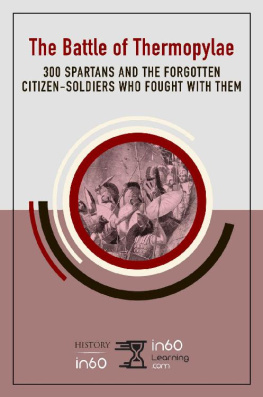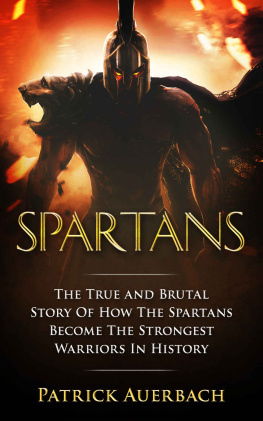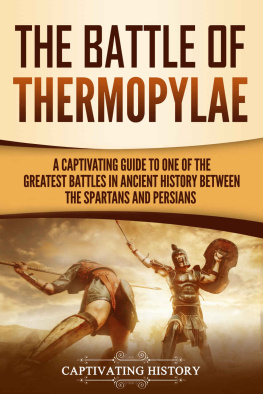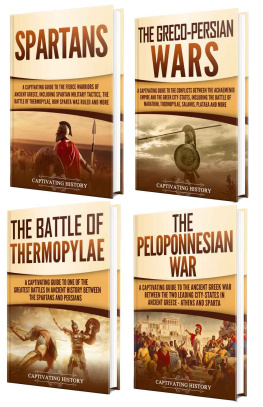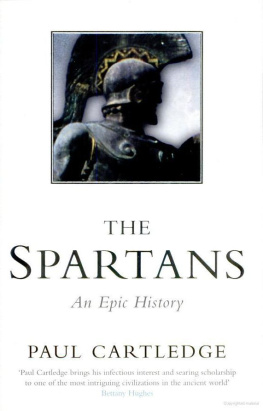in60Learning - The Battle of Thermopylae: 300 Spartans and the Forgotten Citizen-Soldiers Who Fought with Them (HistoryIn60)
Here you can read online in60Learning - The Battle of Thermopylae: 300 Spartans and the Forgotten Citizen-Soldiers Who Fought with Them (HistoryIn60) full text of the book (entire story) in english for free. Download pdf and epub, get meaning, cover and reviews about this ebook. year: 2018, genre: History. Description of the work, (preface) as well as reviews are available. Best literature library LitArk.com created for fans of good reading and offers a wide selection of genres:
Romance novel
Science fiction
Adventure
Detective
Science
History
Home and family
Prose
Art
Politics
Computer
Non-fiction
Religion
Business
Children
Humor
Choose a favorite category and find really read worthwhile books. Enjoy immersion in the world of imagination, feel the emotions of the characters or learn something new for yourself, make an fascinating discovery.
- Book:The Battle of Thermopylae: 300 Spartans and the Forgotten Citizen-Soldiers Who Fought with Them (HistoryIn60)
- Author:
- Genre:
- Year:2018
- Rating:4 / 5
- Favourites:Add to favourites
- Your mark:
- 80
- 1
- 2
- 3
- 4
- 5
The Battle of Thermopylae: 300 Spartans and the Forgotten Citizen-Soldiers Who Fought with Them (HistoryIn60): summary, description and annotation
We offer to read an annotation, description, summary or preface (depends on what the author of the book "The Battle of Thermopylae: 300 Spartans and the Forgotten Citizen-Soldiers Who Fought with Them (HistoryIn60)" wrote himself). If you haven't found the necessary information about the book — write in the comments, we will try to find it.
in60Learning: author's other books
Who wrote The Battle of Thermopylae: 300 Spartans and the Forgotten Citizen-Soldiers Who Fought with Them (HistoryIn60)? Find out the surname, the name of the author of the book and a list of all author's works by series.
The Battle of Thermopylae: 300 Spartans and the Forgotten Citizen-Soldiers Who Fought with Them (HistoryIn60) — read online for free the complete book (whole text) full work
Below is the text of the book, divided by pages. System saving the place of the last page read, allows you to conveniently read the book "The Battle of Thermopylae: 300 Spartans and the Forgotten Citizen-Soldiers Who Fought with Them (HistoryIn60)" online for free, without having to search again every time where you left off. Put a bookmark, and you can go to the page where you finished reading at any time.
Font size:
Interval:
Bookmark:
The Battle of Thermopylae
300 Spartans and the Forgotten Citizen-Soldiers Who Fought with Them
In60Learning
Copyright 2017 In60Learning
All rights reserved.
ISBN:
ISBN-13:
CONTENTS
A Tale of Two Greek Cities | ||
Styles of War | ||
The Persians Turn to Greece | ||
Preparing for War | ||
The Battle of Thermopylae Begins | ||
A Glorious Last Stand | ||
The War Ends | ||
Bibliography |
1 A Tale of Two Greek Cities
These [men] are Spartas walls.
- King Agesilaus, when asked why Sparta had no walls
The brave last stand of three hundred Spartans against the unrelenting Persian army is one of the most well known ancient tales in the modern world, even more so having been immortalized on film in the colorful, though factually questionable movie, 300. It is a battle that holds great importance in the shaping of western culture, and though its military value is often overstated, its psychological impact is undeniable.
It is strange that much of the story is forgotten or omitted, despite the large number of ancient sources that describe the action in detail. The tale today is that of only three hundred men, desperately holding the pass in the hopes that maybe the rest of Greece will rally, find their courage, and come to fight. Yet historians know that many representatives of Greece were present at the battle, and though three hundred Spartans did fight there, so did 5700-7200 Grecian hoplites.
Ignoring this fact abandons one of the greatest victories that came from the defeat at Thermopylaethe cohesion of vastly different Grecian city-states, some of which were actively at war with one another, in order to fight the Persian enemy. The second Persian invasion of Greece was hugely influential on the development of the idea of one Grecian people. Though inhabiting neighboring lands and speaking the same language, the Greek city-states held vastly different beliefs and cultural values, leading to great conflict amongst them. Yet when threatened by an outside power, they managed to work for their own survival. Nothing can demonstrate the differences between the cities better than the two largest powers of the time, the Athenians and the Spartans.
The modern adjective Spartan, meaning to have an indifference to comforts and luxuries, comes from the lifestyle of the ancient Spartan people. Sparta, also called Lacedaemon, was the chief city of a greater region known as Laconia. It was one of many Greek city-states that operated with a similar political and economic structure in its early existence. In the late 7th century B.C., Sparta fell under the rule of Lycurgus, who put reforms into place that would create the Sparta that is remembered today.
Lycurgus began by ridding Spartan money of all gold and silver coins and leaving only those of iron. In order to have anything of value, one had to collect so much of these coins that they became heavy and ungainly to move. Not only did this decision minimize thieving for practical reasons, but also caused a decline in foreign merchants and purveyors of luxuries, who had no interest in the coins of little value. In this way, men and women could no longer prosper by spending their time honing luxuries. Instead, they fell to making items that were useful, such as furniture and tools for daily life.
He also decreed that everyone in the city should eat together. Dainty dishes and ornate displays of wealth by the rich were eliminated. Those who overate would be mocked by others. This practice kept all eating the minimum food necessary so that their bodies remained trim. Possessions were held in common. A Spartan in need of dogs or horses for hunting could borrow his neighbors. Likewise, children were considered the equal responsibility of all. So, a neighbor was just as free to reward or punish a child, as was the childs own family.
In other Greek city-states, the women were confined to activities such as sewing and wool working, but Lycurgus argued that a free womans highest purpose was making children. He believed that where both parents were strong their progeny would be found to be more vigorous. Therefore, the training of womens bodies was considered as important as that of men. To the shock of other Greek cities, Sparta held games and contests of strength and fitness for men and women alike. Even marriage customs were designed to maintain this ideal of strength being passed to offspring. Lycurgus decreed that husbands and wives should seldom see each other, as he believed that the passionate intercourse resulting from sexual deprivation would result in a stronger child.
Marriage, as he ordained it, must only take place in the prime of bodily vigour, this too being, as he believed, a condition conducive to the production of healthy offspring. Or again, to meet the case which might occur of an old man wedded to a young wife. Considering the jealous watch which such husbands are apt to keep over their wives, he introduced a directly opposite custom; that is to say, he made it incumbent on the aged husband to introduce someone whose qualities, physical and moral, he admired, to play the husband's part and to beget him children. Or again, in the case of a man who might not desire to live with a wife permanently, but yet might still be anxious to have children of his own worthy the name, the lawgiver laid down a law in his behalf. Such a one might select some woman, the wife of some man, well born herself and blest with fair offspring, and, the sanction and consent of her husband first obtained, raise up children for himself through her.
The upbringing of children was also heavily regulated in Sparta. Upon the birth of a child, the newborn would be presented at a place called Lesche to the elders of their specific tribe. The elders would judge the strength and physical structure of the child and then decide whether the child would be kept or exposed to the elements and left to die. Those that survived remained unclothed and were taught by their nurses not to be afraid and not to cry or be irritable with their elders.
When the children were seven years old, they were taken together to live under the same order and discipline, doing their exercises and playing together. Of these, he who showed the most conduct and courage was made the captain. The children lived under the command of this captain, obeying his orders and enduring any punishments he might assign. Their entire childhood was therefore geared toward military discipline and obedience. Unlike other Greek city-states where the children of wealthy and powerful lords automatically became commanders, the Spartans chose their leaders based on merit and groomed them for their positions from seven years of age.
As they grew older, their training and discipline increased. Once the children reached twelve years of age, they lived and trained together in small groups and were intentionally underfed. Children were encouraged to steal in order to practice their ingenuity and resourcefulness. If caught, they were whipped as a punishment, not for stealing but for failing to do so successfully. Plutarch reports that he himself witnessed several Spartan children whipped to death after being caught. He also tells a story that a youth, having stolen a young fox and hid it under his coat, allowed it to tear out his very guts with its teeth and claws, and died upon the place, rather than let it be seen.
Thus as Spartan men entered their young adulthood, they were physically fit, stealthy, quick and resourceful, trained in combat skills, disciplined in military obedience, and regarded an honourable death as preferable to an ignoble life. The Spartans held slaves conquered from neighboring regions. Putting the slaves to work on farming, building, and all other normal aspects of life, the Spartans left their young men free for constant military training. Spartans even chose two kings to rule together in order to maintain leadership when one fell in battle. This was the nation that would lead the Grecian land forces into battle against the Persians.
Next pageFont size:
Interval:
Bookmark:
Similar books «The Battle of Thermopylae: 300 Spartans and the Forgotten Citizen-Soldiers Who Fought with Them (HistoryIn60)»
Look at similar books to The Battle of Thermopylae: 300 Spartans and the Forgotten Citizen-Soldiers Who Fought with Them (HistoryIn60). We have selected literature similar in name and meaning in the hope of providing readers with more options to find new, interesting, not yet read works.
Discussion, reviews of the book The Battle of Thermopylae: 300 Spartans and the Forgotten Citizen-Soldiers Who Fought with Them (HistoryIn60) and just readers' own opinions. Leave your comments, write what you think about the work, its meaning or the main characters. Specify what exactly you liked and what you didn't like, and why you think so.

